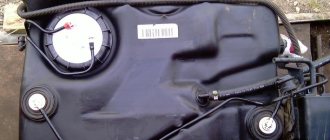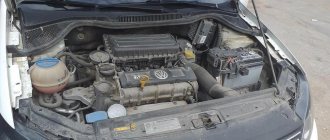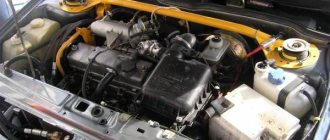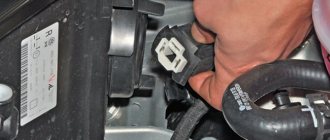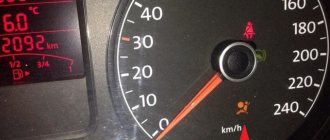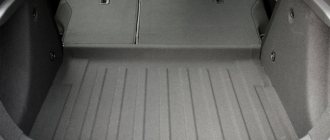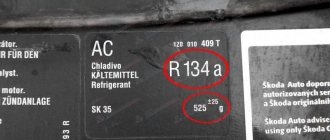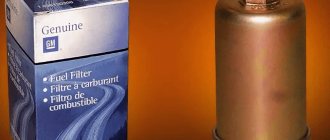Fuel consumption of Volkswagen Polo with different engine sizes
The Volkswagen Polo is equipped with power plants of various sizes and automatic, manual and robotic gearboxes.
Depending on this, the fuel consumption of a car per 100 km varies. The most popular Volkswagen Polo models with 1.2, 1.4 and 1.6 liter engines are shown in the table below.
Volkswagen Polo Hatchback 1.4 DSG › Logbook › Hey, what is the tank volume?
Overall dimensions of the Volkswagen Polo sedan
I haven’t written anything for a long time, because... There’s not much to write about. I’ll probably change the wheels tomorrow, I need to change the oil soon, that’s basically it)
Just stopped by a gas station, this is a record:
I’m thinking of writing an angry letter somewhere, and I’ll probably avoid Shell.
By the way, the tank was not completely empty, the light came on right before refueling, literally 200 meters away.
In general, it’s unpleasant.
Good luck to everyone and good refueling)
UpDate: The filled gasoline was enough for 738 km, in the combined cycle (mainly in the city). It turns out, 50.4 l/738 km * 100 = 6.83 l/100 km. It’s very similar to the truth, apparently they weren’t deceived after all.
Mileage: 149,300 km
Gasoline selection
The manufacturer recommends pouring fuel with an octane rating of 95 into the Volkswagen Polo gas tank. The filler cap also carries this information.
In addition to the fuel specified by the automaker, owners fill in 92 and 98 gasoline. According to driver reviews, the sensations from using fuel with different octane numbers are summarized in the table below.
Table - The influence of octane number on the behavior of the Volkswagen Polo car
| Octane number | Description |
| AI-92 | Suitable for a quiet ride. Economical. Pressing the pedal to the floor leads to detonation, regardless of the crankshaft speed. Failures during acceleration and unstable idling are often observed. |
| AI-95 | Detonation is extremely rare and appears only at low speeds on cars equipped with manual transmission. Cars with an automatic transmission practically do not experience engine detonation. |
| AI-98 | Provides the best dynamics, as a result of which the car accelerates more confidently. The motor runs smoother and quieter. There are no failures in acceleration. |
Restyling Polo 2015
Overall dimensions of the Volkswagen Polo sedan
In the spring of 2015, Volkswagen introduced a restyled version of the Polo Sedan New, the new version differs from the old one:
- bumpers;
- another radiator grille;
- modified hood.
Also, wheels and caps of a different design began to be installed on the car, “beige metallic” was added to the body colors, but the headlights did not change in the restyling.
There have been changes in the interior as well:
- the steering wheel has become somewhat different;
- The seat upholstery has been changed.
Front parking sensors were added as standard, and the side mirrors were equipped with electric folding mirrors.
Fuel tank volume
The gas tank installed on the Volkswagen Polo allows you to travel from 600 to 850 kilometers without the need to refill the fuel tank. All this is possible thanks to its volume from 42 to 55 liters.
Cars currently coming off the production line are equipped with two types of gas tanks, depending on the body type:
- The sedan is equipped with a 55-liter fuel tank;
- The hatchback is equipped with a 45-liter gas tank.
It is recommended to add fuel without waiting for it to reach the lower mark. This is due to the fact that the gas pump is more loaded when there is less than 25% of the maximum fuel volume in the tank. Also, low gasoline levels create a risk of debris from the bottom of the fuel tank being drawn into the filter.
Volkswagen Polo Tank size
GTi
| Appearance | Year | Fuel tank capacity | Analytics |
| 2020 | 45 liters | ||
| 2019 | 45 liters | ||
| 2018 | 45 liters | ||
| 2017 | 45 liters | ||
| 2016 | 45 liters | ||
| 2015 | 45 liters | ||
| 2014 | 45 liters | ||
| 2013 | 45 liters | ||
| 2012 | 45 liters | ||
| 2011 | 45 liters | ||
| 2010 | 45 liters | ||
| 2008 | 45 liters | ||
| 2007 | 45 liters | ||
| 2006 | 45 liters |
Polo Hatchback
| Appearance | Year | Fuel tank capacity | Analytics |
| 2020 | 45 liters | ||
| 2019 | 45 liters | ||
| 2018 | 45 liters | ||
| 2017 | 45 liters | ||
| 2016 | 45 liters | ||
| 2015 | 45 liters | ||
| 2014 | 45 liters | ||
| 2013 | 45 liters | ||
| 2012 | 45 liters | ||
| 2011 | 45 liters | ||
| 2010 | 45 liters | ||
| 2009 | 45 liters | ||
| 2008 | 45 liters | ||
| 2007 | 45 liters | ||
| 2006 | 45 liters | ||
| 2005 | 45 liters | ||
| 2004 | 45 liters | ||
| 2003 | 45 liters | ||
| 2002 | 45 liters | ||
| 2001 | 45 liters | ||
| 2000 | 45 liters | ||
| 1999 | 45 liters | ||
| 1998 | 45 liters | ||
| 1997 | 45 liters | ||
| 1996 | 45 liters | ||
| 1995 | 45 liters | ||
| 1994 | 45 liters |
Polo Sedan
| Appearance | Year | Fuel tank capacity | Analytics |
| 2001 | 45 liters | ||
| 2000 | 45 liters | ||
| 1999 | 45 liters | ||
| 1998 | 45 liters | ||
| 1997 | 45 liters | ||
| 1996 | 45 liters |
Polo Station Wagon
| Appearance | Year | Fuel tank capacity | Analytics |
| 2001 | 45 liters | ||
| 2000 | 45 liters | ||
| 1999 | 45 liters | ||
| 1998 | 45 liters |
People who viewed this data also read
Description of the reasons for high fuel consumption and their solutions
If fuel consumption increases after refueling at a gas station, the reason for this is low quality fuel. To eliminate this situation, it is necessary to drain the gasoline from the gas tank and, if possible, flush the fuel line. The filter also needs to be changed. Prolonged operation of the vehicle on low-quality gasoline is not recommended, as excessive wear of the power plant and related systems is possible.
Another reason for increased fuel consumption may be damage to the fuel system. The most common problem is the gas tank. Damage may occur as a result of hitting an uneven road surface or jumping over a curb. To eliminate the malfunction, it is necessary to inspect the elements of the fuel system by descending under the bottom of the car. If damage is detected, it must be repaired. Operating a vehicle with leaking fuel is prohibited, as there is a risk of fire.
Incorrect tire pressure leads to increased rolling resistance. For this reason, the driver has to press the gas pedal harder to the floor to maintain speed. You can identify deviations in tire pressure by visually inspecting the condition of the tread or using a pressure gauge. The problem can be resolved by inflating the wheels to the required pressure.
Styling and tuning if done incorrectly also cause increased gas mileage. Many elements intended for external modification of a car do not pass wind tunnel tests. As a result, air resistance to movement increases and it is more difficult for the car to maintain a given speed. To eliminate increased gasoline consumption, it is necessary to remove all incorrectly installed tuning elements. In case of modernization of the power plant, it is also possible to increase the volume of fuel consumption. To eliminate it, it is necessary to dismantle the stock elements.
The vehicle's roll and the condition of the suspension affect fuel consumption. If the driver notices that the free run of the car has become smaller, it is recommended to visit a service station and check the car for wheel alignment. In case of deviation from the norm, it is necessary to adjust the parameters.
Engine breakdowns or general excessive wear lead to suboptimal fuel combustion, which results in increased fuel consumption. To eliminate this phenomenon, it is necessary to replace worn parts with new ones. In some cases, a major overhaul of the power plant may be required.
The amount of fuel consumed directly depends on compliance with maintenance intervals. Contaminated air or oil filters affect the operation of the power unit. The drop in its power is accompanied by an increase in the volume of fuel consumed. To eliminate the resulting increased fuel consumption, it is necessary to carry out maintenance, observing the deadlines specified by the manufacturer.
Technical characteristics of Volkswagen Polo
| engine's type | petrol | |||
| Engine capacity | 1.6 | 1.4 | ||
| Gearbox type | Mechanics | machine | Mechanics | robot |
| Number of gears | 5 | 6 | 6 | 7 |
| Drive unit | front | front | front | front |
| Body type | + | + | + | + |
| local body type | sedan | sedan | sedan | sedan |
| driver position | left hand drive | left hand drive | left hand drive | left hand drive |
| External dimensions | + | + | + | + |
| total length | 4390 | 4390 | 4390 | 4390 |
| overall width | 1699 | 1699 | 1699 | 1699 |
| overall height | 1467 | 1467 | 1467 | 1467 |
| ground clearance (without loading) | 163 | 163 | 163 | 163 |
| wheelbase | 2553 | 2553 | 2553 | 2553 |
| front axle | 1457 | 1457 | 1457 | 1457 |
| rear axle | 1500 | 1500 | 1500 | 1500 |
| Luggage compartment volume | + | + | + | + |
| rear seats raised: standard volume for rear seats. (l) | 460 | 460 | 460 | 460 |
| Drive unit | + | + | + | + |
| driving wheels | front | front | front | front |
| Engine | + | + | + | + |
| cubic centimeters | 1598 | 1598 | 1395 | 1395 |
| liters | 1.6 | 1.6 | 1.4 | 1.4 |
| cylinder diameter | 76.5 | 76.5 | 76.5 | 76.5 |
| piston stroke | 86.9 | 86.9 | 75.6 | 75.6 |
| compression ratio | 10.5 | 10.5 | 10.0 | 10.0 |
| number of cylinders | 4 | 4 | 4 | 4 |
| configuration | in-line | in-line | in-line | in-line |
| compression ratio (high) | 10.5 | 10.5 | 10.0 | 10.0 |
| Fuel system | + | + | + | + |
| injector/carburetor | multipoint injection | multipoint injection | direct petrol injection | direct petrol injection |
| Fuel | + | + | + | + |
| Type of fuel | unleaded gasoline | unleaded gasoline | unleaded gasoline | unleaded gasoline |
| fuel octane number | 95 | 95 | 95 | 95 |
| main fuel type | petrol | petrol | petrol | petrol |
| Fuel tank | + | + | + | + |
| type | basic | basic | basic | basic |
| capacity | 55 | 55 | 55 | 55 |
| Dynamics | + | + | + | + |
| max speed, km/h | 178 | 184 | 198 | 198 |
| acceleration 0-100km/h, s | 11.2 | 11.7 | 9.0 | 9.0 |
| Tires | + | + | + | + |
| location | rear | rear | rear | rear |
| width | 175 | 185 | 185 | 185 |
| profile | 70 | 60 | 60 | 60 |
| speed index | H (210 km/h) | H (210 km/h) | H (210 km/h) | H (210 km/h) |
| diameter | 14 | 15 | 15 | 15 |
| Power | + | + | + | + |
| maximum power, kW | 66 | 81 | 92 | 92 |
| maximum power, hp | 90 | 110 | 125 | 125 |
| rpm at max power | 4250 | 5800 | 5000 | 5000 |
| power data for main or additional fuel | basic | basic | basic | basic |
| Suspension | + | + | + | + |
| type | basic | basic | basic | basic |
| location | rear | rear | rear | rear |
| wheel dependency | semi-dependent | semi-dependent | semi-dependent | semi-dependent |
| spring type | coil spring | coil spring | coil spring | coil spring |
| Transmission | + | + | + | + |
| transmission type | mechanical | automatic | mechanical | mechanical |
| number of gears | 5 | 6 | 6 | 7 |
| location of the gear shift lever | on the floor | on the floor | on the floor | on the steering wheel |
| sequential | – | – | – | Yes |
| transmission description | mechanical | automatic with manual mode | mechanical | with two clutches |
| includes gear shift paddles | – | – | – | Yes |
| Weight | + | + | + | + |
| total weight kg | 1700 | 1700 | 1740 | 1740 |
| curb weight kg | 1163 | 1208 | 1223 | 1291 |
| Wheels | + | + | + | + |
| location | rear | rear | rear | rear |
| disk type | steel | steel | cast | steel |
| disc diameter | 14 | 15 | 15 | 15 |
| rim width | 5.0 | 6.0 | 6.0 | 6.0 |
| Fuel consumption | + | + | + | + |
| urban cycle, l/100km | 7.7 | 7.9 | 7.5 | 7.3 |
| extra-urban cycle, l/100km | 4.5 | 4.7 | 4.7 | 4.8 |
| mixed cycle, l/100km | 5.7 | 5.9 | 5.7 | 5.7 |
| urban cycle, km/l | 13.0 | 12.7 | 13.3 | 13.7 |
| extra-urban cycle, km/l | 22.2 | 21.3 | 21.3 | 20.8 |
| combined cycle, km/l | 17.5 | 16.9 | 17.5 | 17.5 |
| combined mileage (km) | 962 | 929 | 965 | 965 |
| engine's type | + | + | + | + |
| type | basic | basic | basic | basic |
| Compressor | – | – | + | + |
| compressor | – | – | turbine | turbine |
The fifth generation of the legendary Volkswagen model is distinguished by excellent technical characteristics for the Volkswagen Polo. Reliable sedans are equipped with technologically advanced engines with a displacement of 1.6 liters and a power of 90 or 110 hp. in combination with a 6-speed automatic and 5-speed manual transmission. A 1.4-liter TSI turbocharged engine with a maximum power of 125 hp, equipped with a 6-speed manual transmission or 7-automatic transmission, is also available as an option. Fuel consumption in the combined cycle is only 5.7 - 5.9 liters per 100 km, and the fuel tank holds 55 liters of gasoline.
The safety and comfort of the new Volkswagen Polo is ensured by ESP and cruise control stabilization systems, unique ParkPilot parking sensors located in front and behind the car, as well as automatic light and rain sensors, allowing less distraction from driving the car. The official dealer of the German brand in Moscow, Volkswagen Favorite Hoff, offers 2018-2019 cars adapted for use in Russia, including technical characteristics unique to the Volkswagen Polo. A high-capacity battery and a high-power starter allow cold starting of the engine in frosty weather at temperatures down to minus 36˚C.
Auto parts for foreign cars, auto repair
Some motorists use 92, which is also not bad, but no longer has the properties of 95 fuel. The fuel consumption of a Volkswagen Polo per kilometer looks like this: The volume of the Volkswagen Polo fuel tank, which holds fifty-five liters of gasoline, is not a bit inferior to other passenger cars of the same level. You can search for a long time for the answer to the question why the fuel tank capacity of the Volkswagen Polo sedan tank is endowed with several additional liters in addition to 55 liters.
To eliminate it, it is necessary to dismantle the stock elements. The vehicle's roll and the condition of the suspension affect fuel consumption. If the driver notices that the free run of the car has become smaller, it is recommended to visit a service station and check the car for wheel alignment. In case of deviation from the norm, it is necessary to adjust the parameters. Failures in the engine or its general excessive wear lead to suboptimal fuel combustion, which as a result causes an increase in the capacity of the fuel tank of the Volkswagen Polo sedan.
To eliminate this phenomenon, it is necessary to replace worn parts with new ones. In some cases, a major overhaul of the power plant may be required. The amount of fuel consumed directly depends on compliance with maintenance intervals. Contaminated air or oil filters affect the operation of the power unit.
(SOLVED) Tank divisions
The drop in its power is accompanied by an increase in the volume of fuel consumed. To eliminate the resulting increased fuel consumption, it is necessary to carry out maintenance, observing the deadlines specified by the manufacturer. Tired of paying fines? There is an exit!
Forget about fines from cameras! More details at the link. Absolutely legal fuel tank capacity for Volkswagen Polo sedan Installed independently in 2 minutes. Invisible to the human eye, does not deteriorate due to weather. 2 year warranty, parts. The volume of the Volkswagen Polo fuel tank is fifty-five liters, and this is not the limit.
If the warning light comes on, there is no need to panic. There is still at least 5 liters of gasoline in the tank.
Prices and options
If in 2010 the Volkswagen Polo Sedan could be bought in the basic version from 399 thousand rubles, then in the summer of 2017 the cost of the car starts from 579.5 thousand rubles. In total, Polo has five trim levels:
- Conceptline;
- Trendline;
- Comfortline;
- Heinlein;
- Allstar.
The basic equipment of the Conceptline includes the following options:
It is also worth noting the athermal glazing of the cabin, the steering column, which can be adjusted in height and reach. The trunk is equipped with a full-size spare wheel, the wheels are steel, 14x5J. Standard tires coming from the factory are size 175/70.
The most expensive equipment is Highline, with this equipment the car costs 750-800 thousand rubles, additional Highline options:
- front armrest;
- decorative inserts in the interior made of matte chrome;
- heated windshield;
- climate control;
- RCD radio;
- standard alarm.
Side mirrors and door handles are painted in body color, alloy wheels with a radius of R15 are installed.
On the secondary market, Polo Sedan models are sold on average from 400 to 550 thousand rubles, most often cars from 2011-2015 are offered
Occasionally, entire cars are put up for sale at a very inexpensive price, but you should buy them carefully - it is possible that scammers are involved in the trade, or that the car’s documents are not in order
Technical characteristics of Volkswagen Polo
The creators of the Volkswagen Polo were given the task of designing a car that could fully meet the level of Russian roads. A strong car suspension should not cause any complaints, and the car moves well and steadily along the road. The car does not require large expenses for its maintenance, fuel tank capacity and technical inspection.
Fuel consumption is seven to eight liters, which indicates the car is a small car. Many experts advise refueling a Volkswagen Polo with 95-grade gasoline, which significantly improves the vehicle's dynamics.
Some motorists use 92, which is also not bad, but no longer has the properties of 95 fuel.
The fuel consumption of a Volkswagen Polo per kilometer looks like this: The volume of the Volkswagen Polo fuel tank, which holds fifty-five liters of gasoline, is not a bit inferior to other passenger cars of the same level. You can search for a long time for the answer to the question why the tank is equipped with several additional liters in addition to 55 liters.
The answer is very simple: And remember, the capacity of the fuel tank of a Volkswagen Polo sedan; you do not need to fill the gas tank all the way, since the neck of the tank will still not hold a large amount of gasoline. As a result, air resistance to movement increases and it is more difficult for the car to maintain a given speed. To eliminate increased gasoline consumption, it is necessary to remove all incorrectly installed tuning elements.
In case of modernization of the power plant, it is also possible to increase the volume of fuel consumption. To eliminate it, it is necessary to dismantle the stock elements. The vehicle's roll and the condition of the suspension affect fuel consumption.
If the driver notices that the free run of the car has become smaller, it is recommended to visit a service station and check the car for wheel alignment. In case of deviation from the norm, it is necessary to adjust the parameters.
Failures in the engine or its general wear and tear lead to non-optimal fuel combustion, which as a result causes an increase in consumption. To eliminate this phenomenon, it is necessary to replace worn parts with new ones. In some cases, a major overhaul of the power plant may be required.
The amount of fuel consumed directly depends on compliance with maintenance intervals. Contaminated air or oil filters affect the operation of the power unit.
The drop in its power is accompanied by an increase in the volume of fuel consumed. When calibrating the fuel tank, it turned out that the first segment, consisting of two small segments, is equal to 5 liters, and the last segment is equal to 8 liters, the rest are approximately 6.5 liters each.
Adding up all these segments and not forgetting to add 5 liters below zero, we get 57 liters.
Recommendations
Comments 33
Pfff... I once had 56 liters poured into a tank that was not yet dry. I wouldn’t have paid any attention to sales if my wife hadn’t seen the numbers on the column through the window. It’s a pity that I said about this when we had already left the gas station and I threw away the receipt...
45 is for normal use. The plastic tank can probably swell up to 50 with all the hoses. Well, it will also burst from such a quantity at some point.
Somehow they pressed in beyond full
15 liters, I was also very angry, I told everyone what I thought about them, but then I drove about 500 km before the first tank mark went away)) I realized that they didn’t heat me up, but nevertheless no one asked to press so much into the tank them... after that, if I always said “until full,” then I added “until the first shooting”))
So far I've driven 150, all the marks are in place)) Yes, it looks like they pressed it into me too. But still the sediment remained, and I also didn’t ask anyone to pour it to capacity
On the main road they recently talked about volume, but only on a sedan.
yeah, I looked. I reset the counter, I'll see how many km it lasts
What 50 liters! Why are you driving a blizzard here! I argued with the gas station for a month! In the end, 10 liters were returned! I wrote letters to VW! Here is my and VW correspondence! 45 liters, gentlemen, the hatch has a tank! Don’t be stupid! ——— Forwarded message — —— From To: Cc: “Service Desk” Date: Tuesday, December 5, 2021, 20:22 +03:00 Subject: Response to your request (UPDATE 1203943)
Dear Alexander, good afternoon. First of all, thank you for choosing a Volkswagen vehicle. We have carefully read your request and would like to respond with the following. According to information from the manufacturer, the volume of the fuel tank of the Volkswagen Polo Hatchback (VIN: WVWZZZ6RZAY——) is approximately 45 liters, of which 7 liters is the reserve tank volume (the low fuel level indicator lights up). It is recommended to fill the tank with fuel before turning off the fuel nozzle for the first time. Failure to follow these recommendations may result in excess fuel being added to the fuel tank, resulting in fuel splashing and spillage. This may result in fire, explosion and serious injury. More detailed information is reflected in the operating manual of your vehicle in the section: “Refilling with fuel”. We also list the filling volumes of technical fluids for your car: Engine oil: 2.8 liters. Manual gearbox oil: 2.0 liters. Brake fluid: approximately 1.15 liters. Washer fluid: approximately 3.5-5.4 liters. Coolant: 5.6 liters. If you have any other questions, we will be happy to answer them.
Best regards, Nikolay Skiba
Technical consultant Volkswagen Call center “VOLKSWAGEN Group Rus” Phone, [email protected]
Good afternoon! Question about vw polo 6R hatchback 2009 vin WVWZZZ6RZAY——. Tell me the volumes of technical fluids! Especially the volume of the gasoline tank! How many liters is the tank? I would be very grateful for your answer! The point is that at the gas station they filled 49 liters of gasoline when the reading was The instrument panel has 1/4 of a tank and a power reserve of 120 kilometers! I’ve owned the car for almost five years. I’ve never filled such a volume before! I filled the tank as hard as I could until it was full, with approximately the same reading on the instrument panel being 30-38 liters! Once again I will be grateful for your answer!
Application initiator> Alexander Puchkov Contact numbers of the application initiator Car brand> vw Car model> polo VIN> WVWZZZ6RZAY——-
Specifications
| Characteristics | 1.6MT | 1.6MT | 1.6 AT | 1.4 TSI MT | 1.4 TSI AT |
| Engine's type: | Petrol | Petrol | Petrol | Petrol | Petrol |
| Engine capacity: | 1598 | 1598 | 1598 | 1395 | 1395 |
| Power: | 90 hp | 110 hp | 110 hp | 125 hp | 125 hp |
| Acceleration to 100 km/h: | 11.9 s | 10.5 s | 12.1 s | 9.0 s | 9.0 s |
| Maximum speed: | 179 km/h | 190 km/h | 187 km/h | 198 km/h | 198 km/h |
| Consumption in the urban cycle: | 8.7/100km | 8.7/100km | 9.8/100km | 7.3/100km | 7.3/100km |
| Extra-urban consumption: | 5.1/100km | 5.1/100km | 5.4/100km | 4.8/100km | 4.8/100km |
| Combined cycle consumption: | 6.4/100km | 6.4/100km | 7.0/100km | 5.7/100km | 5.7/100km |
| Fuel tank capacity: | 55 l | 55 l | 55 l | 55 l | 55 l |
| Length: | 4390 mm | 4390 mm | 4390 mm | 4390 mm | 4390 mm |
| Width: | 1699 mm | 1699 mm | 1699 mm | 1699 mm | 1699 mm |
| Height: | 1467 mm | 1467 mm | 1467 mm | 1467 mm | 1467 mm |
| Wheelbase: | 2553 mm | 2553 mm | 2553 mm | 2553 mm | 2553 mm |
| Clearance: | 163 mm | 163 mm | 163 mm | 163 mm | 163 mm |
| Weight: | 1161 kg | 1161 kg | 1161 kg | 1161 kg | 1161 kg |
| Trunk volume: | 460 l | 460 l | 460 l | 460 l | 460 l |
| Transmission: | Mechanical | Mechanical | Automatic | Mechanical | Robot |
| Drive unit: | Front | Front | Front | Front | Front |
| Front suspension: | Independent – McPherson | Independent – McPherson | Independent – McPherson | Independent – McPherson | Independent – McPherson |
| Rear suspension: | Semi-independent – torsion beam | Semi-independent – torsion beam | Semi-independent – torsion beam | Semi-independent – torsion beam | Semi-independent – torsion beam |
| Front brakes: | Ventilated disc | Ventilated disc | Ventilated disc | Ventilated disc | Ventilated disc |
| Rear brakes: | Drums | Disk | Disk | Disk | Disk |
| Production: | Kaluga | ||||
| Guarantee: | 2 years unlimited mileage |
Take advantage of the opportunity to save up to 70,000 rubles on your purchase by trading in your old car under the exchange program.
Gas tank capacity, autonomous mileage on gasoline
Gas tank of the Volkswagen Polo sedan, autonomous mileage
| Engine | Gas tank | Full filling | Autonomous mileage on gasoline | ||
| In the city | On the road | Mixed | |||
| 1.0MT | 45 l. | ||||
| 1.4MT | 45 l. | ||||
| 1.6MT | 45 l. | ||||
| 1.6 AT | 45 l. | ||||
| 1.8MT | 45 l. | ||||
| Gas tank capacity in liters. Price per liter of gasoline in calculations: AI-95 - 47.00 rubles. | |||||
Other Sedans
Take advantage of a special offer that will open up a simple way for you to purchase a car with a maximum discount, and will also simplify the preparation of all documents in 1 day.
For more detailed information about these promotions, as well as the cost of cars, please contact our sales managers.
The cost of the gift does not depend on the cost of the vehicle purchased; the buyer can choose any gift from those listed when purchasing the vehicle. We draw your attention to the fact that this site is for informational purposes only and under no circumstances constitutes a public offer as defined by the provisions of Article 437 of the Civil Code of the Russian Federation.
